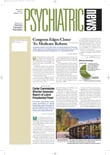Major newspapers momentarily focused national attention on the nation’s deteriorating mental health system when the New Freedom Commission on Mental Health issued its report to President Bush in July.
In an interview with
Psychiatric News, Gary Tischler, M.D., took a long view toward the problems of understanding the significance of the report and exploiting the opportunities it presents.
Tischler served as study director for the report issued by President Jimmy Carter’s Commission on Mental Health 25 years ago.
Tischler said he was “most struck” by the common themes in the two reports: The plight of underserved populations and populations with special needs, the burdens associated with stigma, and the human costs of a fragmented system of care.
Both reports, according to Tischler, stress the importance of creating a more responsive system of care, while demonstrating the difficulties of reforming the system in the face of funding patterns, organizational boundaries, and bureaucracies that complicate the task of coordinating mental health services with each other, with other health care and human services, and with the personal and social supports that sustain people with mental illness in the community.
Tischler said, “Every generation seems to highlight many of the same problems.”
He noted that reports on mental health beginning in 1961 with the “Final Report of the Joint Commission on Mental Illness and Health,” have called for a national priority to meet the needs of people with chronic mental illness.
The repeated identification of the same or similar goals is both “reassuring and troubling,” said Tischler, adding that “it seems as though advances in science and technology far exceed our ability to solve problems related to attitudes, bureaucracies, and the human condition.”
Both reports also noted that greater flexibility in the use of federal funds is necessary at the state and local levels, but Tischler said that a decrease in the federal role for financing health care can bring its own hazards.
“The federal government has been the great equalizer,” he said. “States vary greatly in terms of the resources they can direct to a problem and their willingness to commit those resources.”
The degree of willingness to tackle issues related to financing differentiates the recent report from that of the Carter Commission, Tischler said.
The Carter Commission identified areas in which additional money was needed and even recommended specific amounts, while the New Freedom Commission did not.
“It isn’t enough just to reorganize, improve coordination, or shift funds around,” said Tischler. “Good intentions, excellent ideas, and moral suasion can take you only so far without resources.”
The New Freedom Commission provided only broad guidance about financing issues related to federal programs such as Medicare and Medicaid. For example, although the report supports federal legislation for parity in private insurance, it does not address the issue of parity in funding for Medicare.
The Carter Commission, according to Tischler, made specific proposals about changing the financing of Medicare and Medicaid and also placed funding issues related to mental health in the broad context of financing reforms for the entire health care system.
A focus on recovery in the recent report is another major difference, said Tischler.
The report’s executive summary opens with the statement, “We envision a future when everyone with a mental illness will recover, a future when mental illness can be prevented or cured. . . .”
Tischler believes that this shift to a more optimistic view about the possibilities for recovery brings hope to patients and their families, but he cautioned, “We have learned from experience that overpromising can compromise the best intentions of those whose practices are based on the art of the possible.”
How can advocates work to ensure that the findings of this most recent report are not repeated 25 years from now?
“The report can serve as a rallying point for the mental health advocacy movement,” Tischler said.
He urged the formation of a broad-based coalition that includes patients and their families.
When trying to bring about political changes, it’s a mistake to “stand alone or limit your associations to professional groups,” he said.
“We are dealing with a social good. The quality of mental health services affects millions of people throughout the country. We should continue to seek them out and work with them to achieve a shared vision.”
Tischler said that Rosalynn Carter and Carter Commission Chair Tom Bryant continued to support mental health issues after the official end of the commission’s work through their involvement with the Public Committee on Mental Health, a nonprofit organization that reflected the alliance building that the commission encouraged.
APA is working with the Campaign for Mental Health Reform, a broad-based coalition that includes organizations such as the National Alliance for the Mentally Ill and the National Mental Health Association, as well as specialty organizations such as the Depression and Bipolar Support Alliance and the National Association of County Behavioral Health Directors.
The campaign issued a press release calling for action to implement recommendations of the New Freedom Commission report and subsequently began to identify recommendations that could be implemented with administrative action.
Coalition members have also testified on behalf of the campaign about legislation concerning criminal offenders who are mentally ill and about mental health and substance abuse issues in connection with reauthorization of the Substance Abuse and Mental Health Services Administration (SAMHSA).
The campaign will next expand its effort to identify steps necessary to implement the recommendations, prioritize them, and share the results with SAMHSA officials, who are developing an action plan in response to the recommendations in the New Freedom Commission on Mental Health.
Information about the campaign is posted on the Web at www.mhreform.org. ▪

